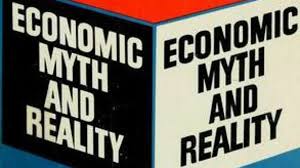
VALUING ECONOMIC LITERACY
Economics touches every part of our lives. We encounter it as workers, parents, citizens, savers, investors and borrowers. It’s at the centre of public debate on everything from education to immigration to the arts. Yet most of us struggle with basic economic concepts such as bond yields, trade deficits and GDP growth.
Turn on the TV or radio and you’ll be bombarded with economic data that screams for your attention. We are surrounded daily by talk of falling interest rates, rising oil prices, ballooning national debt and seesawing exchange rates. This statistical information helps explain the world in which we live.
Even so, most of us have not read an economics textbook, which is why the discipline remains shrouded in mystery. The technical language and mathematical models of economists are not well understood by the populace. Surveys confirm that most people have a poor grasp of economics.
This deficit in economic understanding hinders us in making informed judgments about the accuracy of economic statements that are made. Many people do not have the economic literacy necessary to critically analyse the economic headlines which dominate the 24/7 news cycle.
One of the primary activities of modern governments is to determine economic policies. The media play a central role in informing the public about these polices and explaining them in clear terms. Together, politicians and the media shape public beliefs and attitudes about economic matters.
Public perceptions about the economy have important political consequences. Governments are largely re-elected or rejected based on economic perceptions. Yet on many economic issues, the gap between public perceptions and economic reality is very wide.
This is not entirely the fault of voters who are constantly exposed to plausible-sounding economic misconceptions. These fallacies include many beliefs widely disseminated in the media and by politicians. As noted by American economist Thomas Sowell in the preface to his book, Economic Facts and Fallacies:
Some things are believed because they are demonstrably true. But many other things are believed simply because they have been asserted repeatedly – and repetition has been accepted as a substitute for evidence.
Fallacies abound in economics, affecting everything from domestic housing to international trade. Fallacies also have staying power – even in the face of irrefutable evidence against them. Economists could spend an inordinate amount of their time debunking the scores of economic fallacies.
In Fifty Economic Fallacies Exposed, Geoffrey Wood – Professor Emeritus of Economics – examines a range of popular economic misconceptions and explains how these mistaken beliefs misinform economic discussion. Among other things, he looks at the supposed dangers of international trade, the alleged ability of governments to control the economy and the purported benefits to consumers of regulation.
People embrace economic fallacies due to a phenomenon called the fallacy of composition. This fallacy infers that what is true for an individual is also true for a whole group. A classic non-economic example is that of a person who stands up at a concert so that he/she can see better. But if everyone stands, the view of many spectators will worsen. So, what is true for one individual in the crowd, is not true for the whole stadium.
Thinking about economic issues using the same flawed logic can also lead to incorrect conclusions. For example, our individual experience as a worker is a poor guide to the workings of an economy as a whole. Despite this, those who lose their jobs due to automation typically surmise that technology is a threat to all workers. However, this is an erroneous assumption as new technology does not result in higher overall unemployment.
The misconception that new technology destroys jobs is referred to as the Luddite fallacy. In the early 19th century, English textile workers and weavers protested against the changes ushered in by the Industrial Revolution. These “Luddites” smashed mechanised knitting machines as they believed the new labour-saving devices would steal their jobs.
Paradoxically, by the end of the 19th century, there were – according to economist and author James Bessen – four times as many factory weavers as there had been in 1830. Automation reduced labour costs for factory owners. This, in turn, enabled the price of garments to be lowered. This, in turn again, increased product demand leading to the need for more workers.
Automation allows workers to deliver better, faster, and cheaper services and that’s good for growth and therefore good for the economy. What’s also undoubtedly good for the economy is immigration – but not according to the lump of labour fallacy.
This fallacy is premised on the mistaken belief that the amount of work available in an economy is fixed, so no one can get a job without taking one from someone else. Unsurprisingly, this fallacy is used to prosecute the entrenched myth that migrants steal jobs from native-born workers. It’s an understandable supposition, but it’s incorrect.
Immigrants who gain work also gain income to spend, creating new jobs. Immigration, therefore, increases the demand for labour and stimulates employment. Commenting on the positive impact that immigrant workers have on the US economy, The New York Times Magazine explained that imported workers:
… use the wages they earn to rent apartments, eat food, get haircuts, buy cell phones. That means there are more jobs building apartments, selling food, giving haircuts and dispatching the trucks that move those phones. Immigrants increase the size of the overall population, which means they increase the size of the economy. Logically, if immigrants were “stealing” jobs, so would every young person leaving school and entering the job market; countries should become poorer as they get larger. In reality, of course, the opposite happens.
It is axiomatic that the conventional wisdom which says that immigrants take jobs and lower wages is absolutely wrong. In reality, immigrants create jobs and make native workers more prosperous. As world renowned economist and Nobel Laureate, Paul Krugman, commented “… the (lump of labour) fallacy makes a comeback whenever the economy is sluggish”.
One final economic myth – which has been perpetuated for decades – is the household fallacy. A government is not a household and therefore does not need to manage its finances like a household. The household fallacy disguises this truth by falsely claiming that what is true for an individual household regarding debt is similarly true for a government.
The household analogy is simple: Governments need to live within their means (like households) by not spending more than they receive or risk going broke. In reality, governments do not always need to have a balanced budget. In fact, they can run prudent annual deficits indefinitely, as many countries do. Britain has maintained a national debt for more than 300 years. Going back to 1776, the US has been in continuous debt except for seven short periods.
Balancing the national budget sounds appealing and promising to get it back in the black resonates with many voters. Still, policymakers should avoid playing populist politics by trying to imitate family budgets. Fiscal austerity is commendable at a household level but can equate to economic irresponsibility at a sovereign level. As noted in a UK media article:
The familiar logic of the household analogy has become so embedded into public life that spending proposals that would help tackle some of our most pressing challenges – climate change, the housing crisis, unsustainable household debt – can barely make it out of the door. All too often, such proposals are stopped in their tracks by rival politicians and the media asking where the money is going to come from.
[Note: A fuller explanation of the benefits of government debt can be found in my recent post – Modern Monetary Theory.]
It can be seen that economics is replete with fallacies and has a bad reputation for its lack of precision and certainty. As economics is not a natural science – like physics, chemistry or biology – its propositions are rarely absolutely true or false. Broadly speaking, economics is the study of human behaviour as it relates to money and we humans are neither rational nor predictable.
Even so, it is incumbent on all of us to better educate ourselves in the workings of the economy. What currently passes for a conversation among the electorate about economic issues is often amateurish. So, learning about economics often starts by unlearning what you thought you knew.
We are ignorant of our own ignorance when it comes to economics.
Regards
Paul J. Thomas
Chief Executive Officer
Ductus Consulting


Hello Paul,
I found it very informative/clear to read your descriptions of the various fallacies at play in our individual and collective economic thinking.
I am currently wading through Free Lunch Thinking, How Economics Ruins the Economy. However, Bergman covers just eight topics, albeit comprehensibly.
So it is really beneficial to have further economic variables discussed in your now trademark ‘Bite Size’ mode!
Best wishes to you, Bev and your family for Easter!
Regards,
Des
Hi Paul, keep up your good work. It rained in Sydney for 3 days and 3 nights. Was this an example of what economists call the “trickle down effect”?